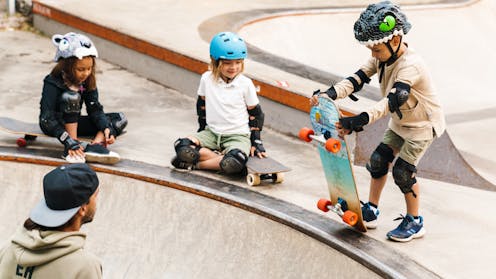What schools can learn from skate culture
At a school in Malmö, Sweden, skateboarding is on the curriculum. John Dahlquist, vice principal of Bryggeriets High School, teaches skate classes and brings lessons from skateboarding into other subjects. By encouraging teenagers to have fun together through skating and beyond, he notices that they want to attend school. Writing in a recent book I co-edited on skateboarding and teaching, Dahlquist notes that he even sees students longing to be back in the classroom after the weekend.
Skateboarding is creative, requiring ingenuity in adapting to new environments. It’s collaborative and social: skaters cheer each other on when they try to learn something new, acknowledging that everyone operates at a different level and faces a distinct challenge.
When skateboarding is done well, individual growth takes place among a community of care and mutual support. And it requires a willingness to fail. There’s no way to master a trick without trying and failing, over and over again.
My colleagues and I have researched the value of a skateboarding philosophy in schools, and how teachers can bring it into their classrooms.
Get your news from actual experts, straight to your inbox. Sign up to our daily newsletter to receive all The Conversation UK’s latest coverage of news and research, from politics and business to the arts and sciences.
Take Dahlquist’s teaching in Malmö. He notes that interweaving skate classes with other subjects has multiple noteworthy effects. The physical activity of skateboarding improves levels of concentration. Some students even say that they’d never been successful in any other learning environment. Elsewhere, they’d be unable to focus on the task at hand.
What’s more, a skateboarding mindset – being prepared to learn difficult tricks in unfamiliar settings – equipped students with the capacity to master other kinds of new skills.
Able to fail
The process of overcoming the anxiety to fail is crucial. Skaters cannot be afraid to fall if they want to learn new tricks. The motivation to learn through repeated efforts helps skaters in other areas of life, too. Skaters at Bryggeriet aren’t worried as much about failing grades, precisely because they see it as an opportunity to learn and move forward.
As Dahlquist says, “At the end of my classes, I usually have to throw my students out of the classroom. A lot of them beg for three more tries: ‘I’ve got this, just give me three more tries. I promise I will learn.‘”
This mindset decreases grades as education’s cornerstone and, by extension, enhances students’ mental health. My colleague Esther Sayers, who conducted fieldwork at Bryggeriets, found another effect. Teachers help students to develop the skills to get motivated, to reach a point of feeling inspired – or what skaters call “stoke”.
Skateboarding fosters a non-competitive learning culture.
PeopleImages.com – Yuri A
Bryggeriets High School isn’t the only place where skateboarding is helping teach people how to learn. Reaching beyond its historical status as a self-regulated street culture, skateboarding now plays an important role in building engaged learning communities across the globe. Berlin-based skate organisation Skateistan hosts skate classes, gives young people access to education and offers funds for young and upcoming community leaders.
Concrete Jungle Foundation co-builds skateparks with young people in Peru, Morocco and Jamaica, in order to exchange knowledge and drive local ownership and apprenticeship. Similarly, the New York-based Harold Hunter Foundation runs skate workshops that also provide mentoring and career guidance.
Colleagues Arianna Gil and Jessica Forsyth have studied working class black and Latin American skate crews, run by genderdiverse community organisers. They found that skate crews such as Brujas and Gang Corp mobilise skaters according to the “for us, by us” spirit.
Challenging institutional models of authority, these skate crews develop services based on the hopes and aspirations of their communities – ranging from teach-ins to recreational programmes. This includes a talk on the history and meaning of hoodies, and modules on the power of storytelling and the danger of propaganda. The crux, here, is to learn about stuff you encounter in your daily lives.
Skaters who experience poverty and oppression create their own ecosystem for learning from one another, from being out of an educational system that is organised in a top-down way. This means creating a grassroots school model where skate crews choose what and how they want to learn. Rather than grades and degrees, education here is structured around the process of learning from your peers – with the idea of passing on this knowledge in the near future.
The effects of this approach are threefold. First, it centers mentorship and apprenticeship, resulting in intergenerational knowledge exchange. Second, skateboarding’s DIY spirit can help overcome access barriers. By embracing grassroots teaching practices and formats, education can be tailored to the specific needs and desires of a community, rather than following standardised learning objectives.
Third, rather than focusing on memorising facts or learning for grades, this new ecosystem is structured around problem-based learning. Presented with worldly problems such as human rights violations and hostile architecture, skaters learn not just how to analyse their surroundings, but also how to cope with and engage oppressive societal structures.
As formal education faces incremental budget cuts and deepened governmental influence, skateboarding shows us new ways to organise our learning spaces. Schools and teachers can engage their students by integrating aspects of a learning culture that decentres evaluations and assessments and celebrates attempts, rather than just successes.
Sander Hölsgens received a ‘starting grant’ from OCW, The Netherlands. He is affiliated with Pushing Boarders, a platform tracing the social impact of skateboarding worldwide.




